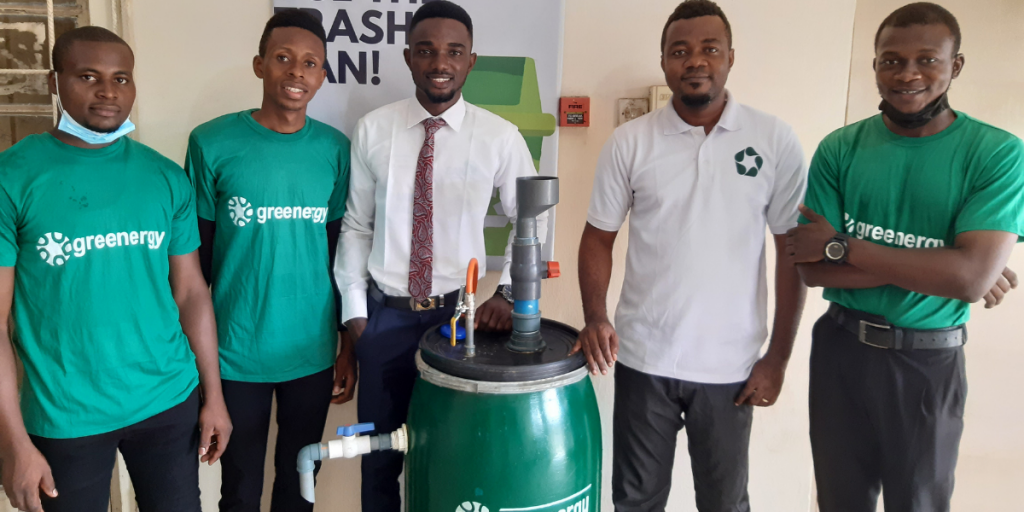Greenenergy: extending bioenergy action to a new generation

Dr Andrew Amenaghawon, RECIRCULATE Post-Doctoral Research Associate at University of Benin, describes a success story for undergraduates working with the RECIRCULATE and ACTUATE team.
An important part of RECIRCULATE and ACTUATE at University of Benin (UNIBEN) is to integrate our undergraduate students into the work of the projects. Part of that is for members of the RECIRCULATE/ACTUATE team to act as mentors to students with interests in clean energy, environmental management, the circular economy and sustainability. There are many positive aspects to mentoring, not just for the students but for the staff as well. One example has been my own work with a team of budding chemical engineers that has participated in the 2020 LEAP AFRICA’s Youth Leadership Programme, (YLP2020), one of Africa’s largest youth-focused programmes. YLP aims to empower young Africans with the leadership and problem-solving skills that will enable them to become socially active citizens who can develop and implement change projects in the local communities in line with the Sustainable Development Goals (SDGs).
The journey started with the expression of interest to participate in YLP2020. The programme received applications from numerous student groups in various universities in Nigeria, but only 26 teams made it to the final selection. The UNIBEN team, participating under the team name of “Green Africa Initiative” was among those shortlisted. During the course of the programme, the successful teams were trained on effective leadership and youth participation in nation building, in line with the United Nations Sustainable Development Goals. After the training, the teams proceeded to participate in the YLP Change Project Competition. The competition required all participating teams to implement individual community change projects that would address key issues in their various communities. As the Green Africa Initiative team were committed to clean energy, they developed a project that would address the issue of carbon emissions. The team chose Oluku community in Benin City, Edo State, Nigeria for implementation.
The team called their project “Greenergy”. I worked closely with them, and with extra help from other members of the RECIRCULATE/ACTUATE team, supported the Greenergy team to design and construct a continuous loading mini biodigester capable of converting food and agricultural wastes to methane gas for cooking. Having seen the team’s commitment and hard work, I was delighted when their project won first place in the YLP change project competition.
Along with the two runners-up, Greenergy received seed funding from LEAP AFRICA. The seed funding allowed the Greenergy team to put their project in to practice. As team leader Steve Oshiokhai Eshiemogie explained, “The seed fund that we won was used to purchase materials for the construction of the biodigester and also to organise a “renewable energy and climate change awareness outreach” in Oluku rural community of Edo state.” When the team introduced the technology to the rural dwellers in Oluku, they found that the local community were highly receptive of the technology. More than 75 members of the community took part in the team’s “Clean Energy and Climate Change” awareness activities. The household that had the highest reliance on kerosene and firewood for cooking was gifted a free mini biodigester built by the Greenergy team.
The team’s academic interests and their wider experiences played a major role in developing their Greenergy project. As Steve explained “As a final year Chemical Engineering student, I have an interest in renewable energy technology, and having grown up in one of Nigeria’s rural villages, I also understood the need to move away from heavy reliance on firewood and kerosene for domestic activities. The Greenergy project is an opportunity for me to showcase how bioenergy technology can provide solutions to the energy challenges in rural communities, like the one where I grew up”.
The team were also very aware of the wider benefits of bioenergy. Team member Redemption Edegbe described how “… the YLP competition was a clarion call to contribute my quota towards clean energy production and sustainable energy solutions and an opportunity to engage the local community about the dangers of greenhouse gas emissions”. Another team member, Godwin Ohajiaka, told me- “I got involved with the Green Africa Initiative project because of my interest in environmental management and sustainability and because I am an avid proponent of the UN’s sustainable development goals (SDGs)”. Victor Adetunji added, “I took part in this project because I wanted to contribute to the protection of the environment by reducing the dependence on fossil fuels and to contribute to the achievement of the Sustainable Development Goals.”
From working with them, I also see very clearly that the team members have learned a great deal from their experience of YLP. Bankole Omolade Ibrahim described the project as an “eye-opener”. As well as technical aspects related to biogas technology and biodigester design, he highlighted that “over the course of the project, I was able to learn project management skills and how to work as a team player who is concerned about both team members and overall progress”. Godwin added another point “Most importantly, I learnt more about public orientation. We had a community engagement outreach in the Oluku community in Benin City where we educated them on our locally fabricated digester and its potentials.” Victor developed a similar point “The experience has improved my quest for more actions in the development of the society especially the rural communities. For example, the sight of the aged women in the community using firewood to cook motivated me to take action. Also, I have learnt how to communicate with people irrespective of their class and age. I have learnt how to work in a team to achieve a common goal!”
For me, this has certainly been a success story in the context of the RECIRCULATE/ACTUATE projects as it served as a vehicle for engaging with students as well as the wider community. I have enjoyed working with the Greenergy team and benefitted from this project by improving my own management and mentoring skills, as well as the positive exposure that the success of the project has afforded us.
 |
Dr Andrew Amenaghawon is a Post-Doctoral Research Associate on the RECIRCULATE project as well as AD Performance Engineer on the ACTUATE project. He holds a BEng in Chemical Engineering from the University of Benin, an MSc in Process Systems Engineering from Imperial College London, UK and a PhD from the University of Benin. His contributions to the RECIRCULATE/ACTUATE projects have been vital to the success of the projects till date. |
All articles in The FLOW are published under a Creative Commons — Attribution/No derivatives license, for details please read the RECIRCULATE re-publishing guidelines.
